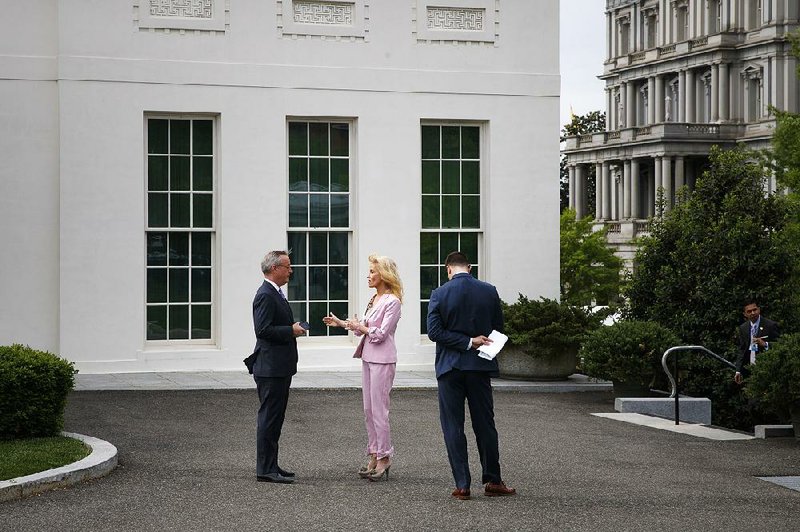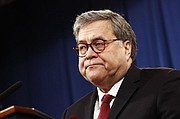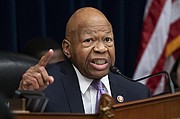WASHINGTON -- The Justice Department said Wednesday that it will not comply with a congressional subpoena for an administration official to testify in a House panel's investigation of the addition of a citizenship question to the 2020 U.S. census.
In a letter to the House Oversight and Reform Committee, Assistant Attorney General Stephen Boyd informed the panel that John Gore, the principal deputy assistant attorney general for the Justice Department's civil-rights division, will not give a deposition.
Gore's refusal to appear before the committee is at the direction of Attorney General William Barr, according to the letter, escalating the fight between the executive and legislative branches.
Boyd said the reason Gore would not appear stemmed from the panel's refusal to allow a department attorney to join him for the deposition. Rep. Elijah Cummings, D-Md., chairman of the committee, has threatened to hold Gore in contempt if he does not appear.
In a statement Wednesday, Cummings said committee investigators would press ahead with the deposition today and hoped Gore would appear.
"As an officer of the court and a senior lawyer in a position of public trust at the Department of Justice, Mr. Gore should be well aware of his constitutional, legal and ethical obligations to comply with a duly authorized subpoena from Congress," Cummings said. "Those obligations have not been erased by the attorney general or the president."
The development came hours after President Donald Trump told The Washington Post in an interview that he opposes current and former White House aides providing testimony to congressional panels, calling it unnecessary after the White House cooperated with special counsel Robert Mueller's probe of Russian interference in the 2016 election and the president's own conduct in office.
"There is no reason to go any further, and especially in Congress where it's very partisan -- obviously very partisan," Trump said.
Trump continued to push back against congressional scrutiny Wednesday morning as he talked to reporters before leaving the White House for a trip to Atlanta.
"I thought after two years we'd be finished with it. No, now the House goes and starts subpoenaing," Trump told reporters on the White House lawn.
"Look, these aren't, like, impartial people," he said. "The Democrats are trying to win 2020."
"The only way they can luck out is by constantly going after me on nonsense," Trump said. "But they should be really focused on legislation."
Jay Sekulow, one of Trump's attorneys, said the plan is to "evaluate each request as they come, but we are not going to allow for congressional harassment," adding that "when appropriate, we will respond appropriately -- which will include litigation when necessary."
Rudy Giuliani, another of the president's attorneys, said, "We're going to fight everything; we already gave them every document and witness we have."
Barr's decision to block Gore's testimony came a day after the White House blocked a top security clearance official from testifying for the oversight panel's probe of the security clearance process. Cummings announced that he would hold the official, Carl Kline, in contempt of Congress in the coming days.
The committee is investigating the administration's plan to add a citizenship question to the 2020 census despite evidence that it could lead to an undercount of millions of people. Officials estimate that about 6.5 million people probably would be affected in states and urban areas with large Hispanic and immigrant populations, places that tend to vote for Democrats.
The decennial count of the nation's population determines the size of each state's congressional delegation, the number of votes it receives in the Electoral College and how the federal government allocates hundreds of billions of dollars.
The Supreme Court is considering a challenge to the administration's planned change to the census.
Kerri Kupec, a spokesman for the department, said Wednesday, "In keeping with longstanding Department of Justice policy, neither Mr. Gore nor anyone else in the Department will be forced to testify in their capacity as a DOJ official on DOJ matters without DOJ counsel."
IMPEACHMENT QUESTION
The White House's push against subpoenas comes amid growing calls from Democrats to open impeachment proceedings even as House Speaker Nancy Pelosi, D-Calif., and other party leaders say that the move is premature.
Asked about impeachment during a Tuesday interview for the Time 100 Summit in New York, Pelosi said that "if the ... fact-finding takes us there, we have no choice. But we're not there yet."
After the special counsel's nearly two-year investigation, Mueller said he did not find sufficient evidence to file charges of criminal conspiracy with Russia against Trump or anyone associated with Trump's campaign. Mueller did not offer a conclusion on whether Trump obstructed justice.
Though Barr determined that there was not sufficient evidence for obstruction of justice, Democrats are using episodes outlined in Mueller's report to continue exploring that issue.
On Wednesday, Trump suggested that he would ask the Supreme Court to intervene if Democrats try to impeach him.
"I DID NOTHING WRONG," Trump said on Twitter. "If the partisan Dems ever tried to Impeach, I would first head to the U.S. Supreme Court. Not only are there no 'High Crimes and Misdemeanors,' there are no Crimes by me at all."
"We waited for Mueller and WON, so now the Dems look to Congress as last hope!" he added.
Trump later told reporters that Mueller's inquiry was "the most thorough investigation probably in the history of our country. I say it's enough."
White House counselor Kellyanne Conway agreed.
"You want to see the nonpartisan, definitive, conclusive taxpayer-funded, lengthy, unobstructed, unimpeded, uninterfered with investigation? You just saw it, and it's called the Mueller report," she said.
Joshua Matz, a lawyer who specializes in constitutional law, said Trump's tweet about Supreme Court intervention "reflects a profound misunderstanding."
While it's possible that the court could play a role on "collateral disputes" arising from an impeachment proceeding, it has "no constitutional warrant to second-guess the substance of an impeachment judgment," Matz said in an email.
"If the President were to seek judicial intervention in that fashion, the courts would almost certainly refuse to hear the case on the ground that it is a 'political question' textually entrusted to Congress by the Constitution," Matz said.
The high court itself said in 1993 that the framers of the Constitution didn't intend for the courts to have the power to review impeachment proceedings. The Supreme Court ruled that impeachment and removal from office is Congress' duty alone.
Information for this article was contributed by Rachael Bade and John Wagner of The Washington Post; and by Jonathan Lemire, Eric Tucker, Darlene Superville, Jill Colvin, Calvin Woodward and Mary Claire Jalonick of The Associated Press.
A Section on 04/25/2019


